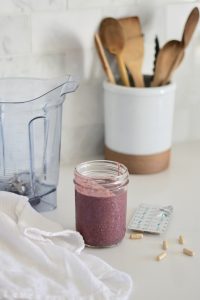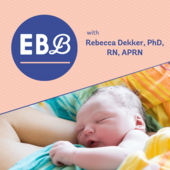
The Evidence Based Birth Podcast – (Episode 7)
Why this podcast?
As a doula, I always want to guide my clients to evidence-based information so that they can make truly informed decisions. Evidence Based Birth is a fantastic website with easy to understand research and information on a whole range of pregnancy and birth-related topics.
From the evidence on being induced or having a cesarean for a big baby to failure to progress; premature rupture of membranes; doulas and a natural labour induction series, they’ve got you covered.
More recently you can find short, informative videos and, of course, a podcast!

How does it look?
The podcast is fairly new but there are already twenty-eight episodes to delve into. Each episode tends to be pretty short, anywhere from nine to twenty minutes and topics covered so far include TENS machines, painless birth, birthing positions, epidurals, water birth, acupuncture and aromatherapy.
Why this episode?
Consuming the placenta in some way is becoming more and more common. From simply cooking it and eating it to putting it in a smoothie, the most palatable option for most people is to have their placenta encapsulated.
Many women swear that consuming their placenta helped them avoid postpartum depression, increased their milk supply, sped up their healing process and gave them more energy.
But, this is all anecdotal evidence. Have there been any scientific studies to support or refute these claims?
That is where this episode comes in!
Who should listen to this episode?
Anyone who is considering consuming their placenta in some way after birth.

The episode
The host, Rebecca Dekker, a nurse who also has a PhD, begins by saying that until recently there hadn’t been any solid studies on the effects of placenta encapsulation.
There were two low-quality studies carried out, the first in 1918 and the second in the 1950’s, and I was pretty surprised to hear that placenta encapsulation was a thing a full hundred years ago.
The claims
Rebecca mentions that there are many sources online that claim consuming your placenta will increase your milk supply, lower your risk of postpartum depression or baby blues, improve your mood and can even increase your iron supply.
High levels of iron in placenta capsules is thought to help prevent postpartum depression but, where’s the evidence for all of these claims?

The first study
In 2016 two studies appeared where the researchers had studied the contents of encapsulated placentas. In the first study, they analysed twenty-eight donated placentas from non-smokers.
It was found that the placentas contained modest amounts of iron (about a quarter of the recommended daily amount for breastfeeding women) and modest or trace amounts of other minerals.
No toxic levels of any elements that they looked at, and no toxic ingredients full stop, were found.
In another publication, also using the twenty-eight donated placentas from non-smokers, the placentas were analysed for hormone levels. They found that there were fifteen hormones that were present in all of the placentas.
Hormones such as progesterone, oestradiol, cortisol and testosterone were found. The levels of each hormone were pretty low but the researchers found that the concentrations of progesterone and oestrodial (a form of oestrogen) were present in levels that could lead to physiological effects.
The effects themselves were not explored as the aim of this study was simply to explore if the hormones and minerals were present.

The second study
In 2017, The Journal of Midwifery and Women’s Health published a study on the effects of placenta encapsulation. Rebecca points out that this was a small, pilot study that is part of a larger randomised trial that is currently being carried out.
This larger trial is a placebo-based trial and is being carried to see if placenta encapsulation has any effect on postpartum depression.
The small study looked at iron levels and iron deficiency anaemia and whether or not placenta encapsulation could help prevent anaemia.
Healthy women were randomly assigned to either take their own encapsulated placenta or a beef placebo. Both pills looked and smelled the same so the women could not know which one they were taking. It is important to note that the researchers did not know either.
Iron and haemoglobin levels were measured at thirty-six weeks of pregnancy and again at four days, one week and three to four weeks postpartum.
The researchers found that most of the women had a decline in their haemoglobin levels (going towards anaemia) a few days after birth but that their levels went up at one week and at three to four weeks in both groups.
Both the anaemia and iron levels improved in both groups.
Apart from the study being very small (only twenty-three women were included) Rebecca also points out that the women included were already eating diets with good levels of iron. Perhaps a study involving women with low-iron diets would be useful.

To wrap up
Is consuming your placenta beneficial?
We don’t know.
At the moment, we simply don’t have scientific evidence to support all the claims that are made about the benefits of placenta encapsulation. However, that doesn’t mean you should not consume your placenta, you should just be aware that the evidence is, at this point, anecdotal.
What the first study featured here did show is that it does not appear to be harmful to encapsulate your placenta so, if you think doing so could help you in your postpartum healing, why not give it a go?
For some more information on consuming your placenta and on finding a properly trained placenta encapsulator, please have a look here.
I’d love to hear from you if you consumed your placenta!
Emily Wills is a doula based in Stockholm. She believes that birth can be a beautiful and empowering experience and started this blog as a way of sharing some really great podcasts. She is also a mother of three and an enthusiastic runner.
